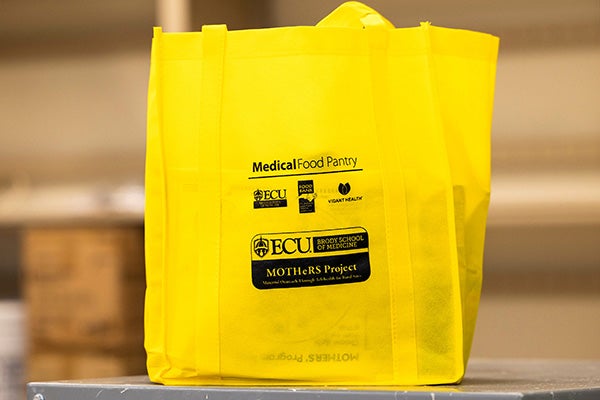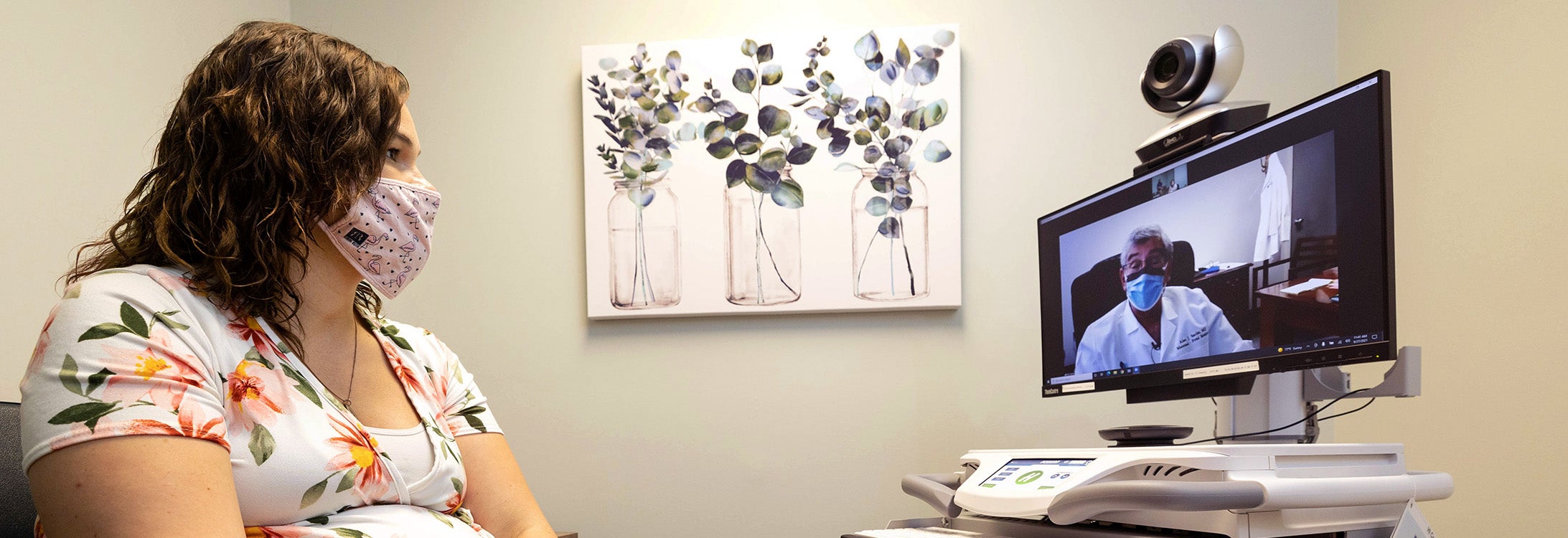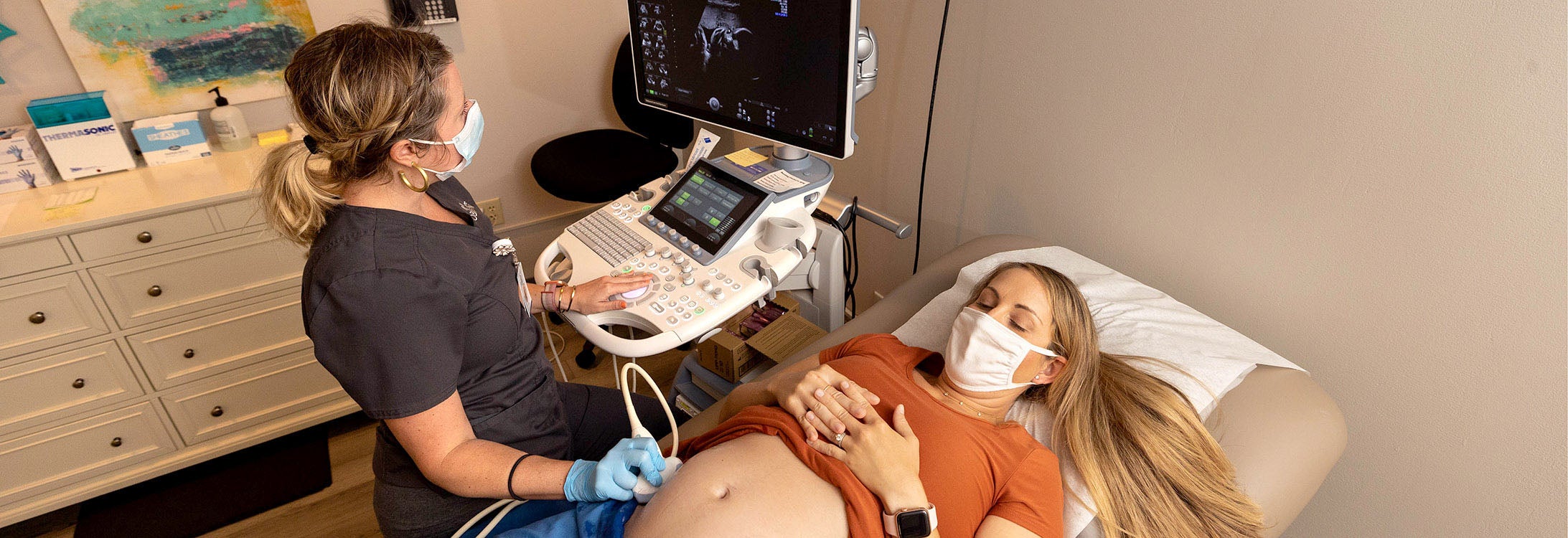HEALTHIER MOMS, HEALTHIER BABIES
Expanded ECU services help NC women with high-risk pregnancies
To get to a prenatal appointment, Stephanie Massey must leave the small town of Newport in the eastern edge of North Carolina and drive 70 miles inland on rural roads to get to a clinic in Greenville — the only place in a two-hour radius with a maternal fetal specialist. It’s a drive she has to make due to her high-risk pregnancy, caused by a blood disorder that increases her chance of clots.
She needs to take time off work, arrange care for her four other children, or pile them into the car and keep them entertained along the way. There will be gas to pay for, wait times to consider, the length of the actual appointment, and then the drive home.
It’s an inconvenience at best and an obstacle for getting the care she needs. Many women in Massey’s position decide not to make the trip at all and forgo important doctor visits.
But it’s no longer a choice they must make. An innovative program that combines telemedicine, telepsychiatry and nutrition support is increasing access to health care for North Carolina mothers and improving health outcomes for their babies. The MOTHeRS Project at East Carolina University was established in 2020 with a $1.2 million investment from United Health Foundation. MOTHeRS stands for Maternal Outreach Through Telehealth for Rural Sites.
Thanks to the MOTHeRS project, Massey can now drive to her local Ob-Gyn 15 minutes away and receive specialist care through telemedicine visits. “It’s nice that all I have to do is come here,” Massey said. “Otherwise, it’d be a whole day I’d have to plan for, and I have a lot going on. It makes life a lot easier.”
The services were first offered to patients at primary care obstetric clinics in Carteret County and have since expanded to clinics in Duplin and Chowan counties.
Healthy moms are more likely to give birth to healthy babies and are less likely to face negative health outcomes themselves. Yet North Carolina moms have a higher-than-average rate of maternal death, according to America’s Health Rankings 2021 Health of Women and Children Report. North Carolina babies also had a high prevalence of low birthweight in the same report.
“Maternal health outcomes in the United States have reached crisis levels compared with the rest of the world. Here in North Carolina, we continue to find that this has been exacerbated by the pandemic as many expectant and new moms experience increased poverty, transportation difficulties, food insecurity and lack of access to care,” said Anita Bachmann, CEO, UnitedHealthcare Community Plan of North Carolina, a UnitedHealth Group company. “We are committed to addressing these issues and this partnership with East Carolina University is allowing us to do just that by increasing access to quality care and resources to meet some of the very basic needs for a healthy mother and healthy baby.”

Along with its telemedicine services, the MOTHeRS project also provides food bags filled with pasta, canned goods and formula.
Dr. Alan Sacks, maternal fetal medicine specialist and clinical professor at ECU’s Brody School of Medicine, believes eastern North Carolina has among the highest risk pregnant women along the East Coast. Many of the pregnant patients that Sacks sees have severe hypertension, diabetes or maternal obesity, and need special care for their medical complications. “Many of these patients need guidance. Our availability remotely has been a major offering for them,” he said.
At Carteret Ob-Gyn in Morehead City, about 15% of the pregnant patients are high risk, said Dr. Nicole D’Andrea. The pandemic has made it more difficult for them to coordinate appointments, she added. Partnering with ECU and the MOTHeRS project allows patients to go to the clinic that they are familiar with and still get the care they need. Physicians there can consult with specialists on patient care plans; provide quiet, private rooms for telepsychiatry visits; and screen patients for food insecurities all in one place. If patients screen positive, they have a cache of food bags filled with pasta, canned goods and formula for them to take home.
“We have an influx of people who don’t have the time, the money or the resources to go far away for quality care. So, I hope that this project continues forever so that we can keep more patients and their babies healthy,” D’Andrea said.
Stephanie Fiust of Morehead City received telehealth visits with Sacks at Carteret Ob-Gyn for her high-risk pregnancy. “Being considered high risk is very scary. The only thing you want to hear when you’re pregnant is that you’re healthy as the mom and that your baby is healthy. So having a support network with the doctors that I know has been crucial for setting my mind at ease,” she said.
The MOTHeRs Project’s ability to offer enhanced access to maternal health services and reduce geographic health disparities dovetails with the missions of the Brody School of Medicine and United Health Foundation. More than 32% of Brody graduates plan to work primarily in underserved areas, compared to 23% of all U.S. medical school graduates. This is especially important during the pandemic, which has contributed to health disparities, particularly among minority communities. The investment from the United Health Foundation, a charitable organization of UnitedHealth Group, is part of its effort to fight COVID-19, support impacted communities and address emerging health care issues related to the pandemic.
“We’re very fortunate that the United Health Foundation recognized the need in our rural health community that was very hard hit by the pandemic. We’re enormously appreciative and very thankful for everything they’ve done,” Sacks said.
Through its ongoing work, the MOTHeRS Project expects not only to provide care to those who need it, but also to generate new knowledge regarding how barriers to care can be better addressed. It aims to be a national model to ensure that every woman in rural America has a safe and healthy pregnancy and delivery.

Stephanie Massey visits Carteret Ob-Gyn for a telemedicine call with Dr. Alan Sacks, a maternal fetal medicine specialist at ECU.
